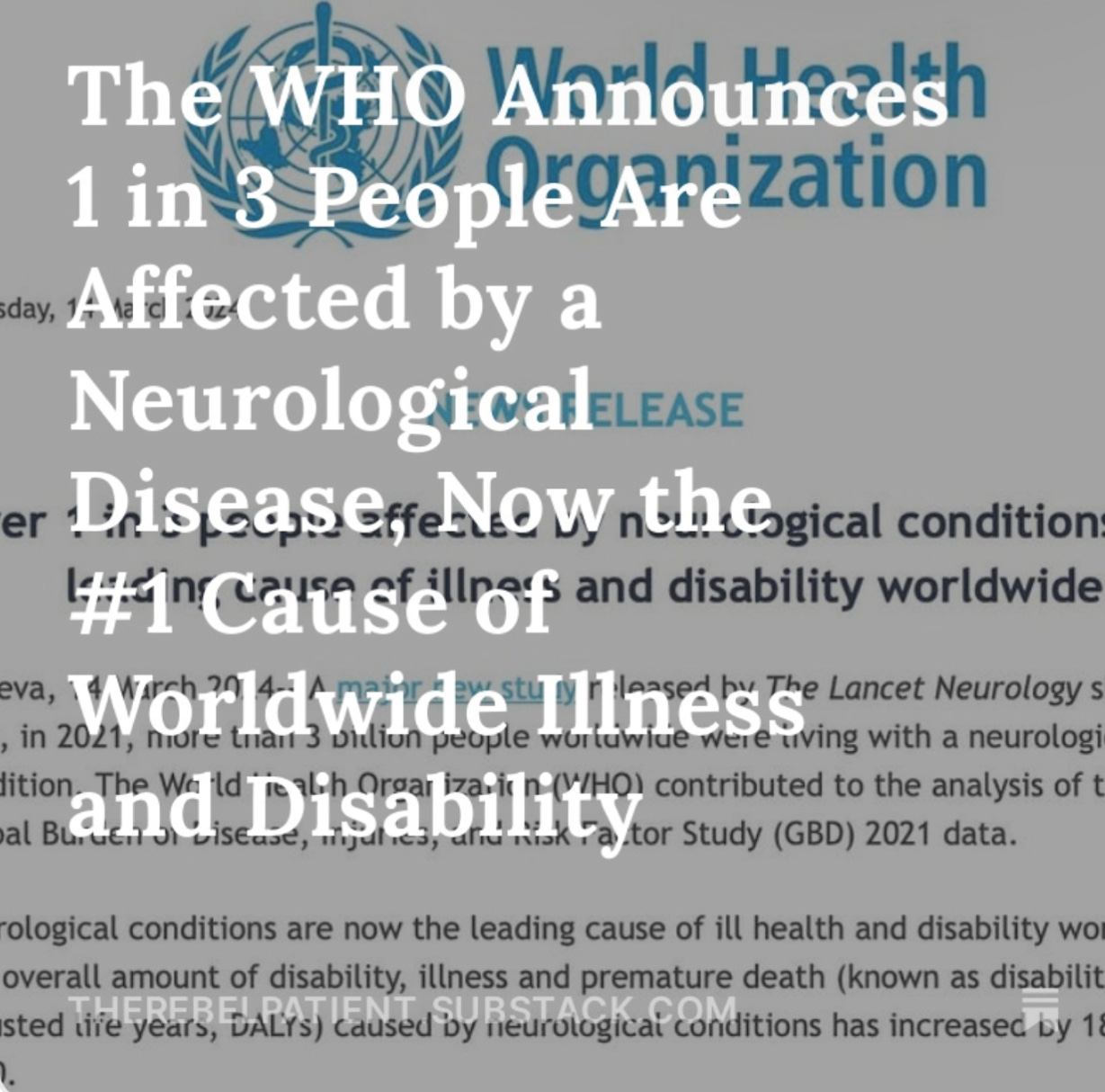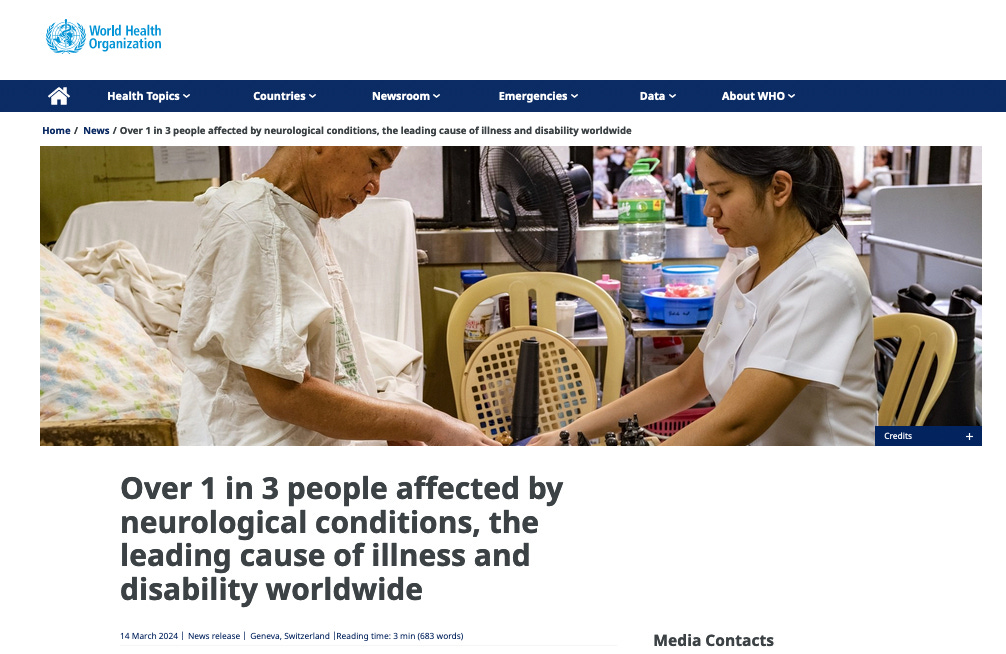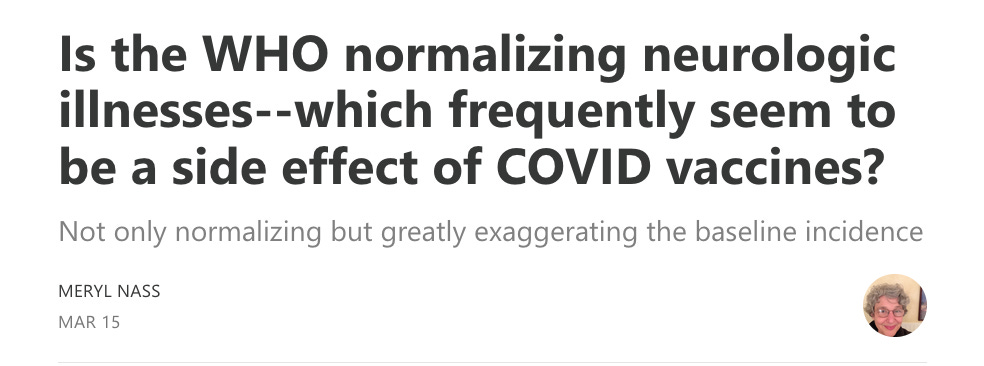The WHO Announces 1 in 3 People Are Affected by a Neurological Disease, Now the #1 Cause of Worldwide Illness and Disability
WHO Makes this March 14, 2024 Announcement, based on a New Study - Is Guillain-Barré Disease the Next New "Normal"?
This is Yesterday’s WHO News Release from Geneva, Switzerland
Special Note: Thank you for supporting Nick Caturano’s LIVESTREAM NOW in Progress for the next 4 hours or so. Listen or Watch HERE.
Emphases are mine. While the content remains untouched, I have separated out quotes, and created bullet points. I have also inserted my opinions outside of the quoted news release.
Over 1 in 3 people affected by neurological conditions, the leading cause of illness and disability worldwide
14 March 2024 | News release | Geneva, Switzerland | Reading time: 3 min (683 words)
A major new study released by The Lancet Neurology shows that, in 2021, more than 3 billion people worldwide were living with a neurological condition.
The World Health Organization (WHO) contributed to the analysisof the Global Burden of Disease, Injuries, and Risk Factor Study (GBD) 2021 data.
It is a conflict of interest for the WHO to help analyze any data, which should be analyzed by an independent group.
Neurological conditions are now the leading cause of ill health and disability worldwide. The overall amount of disability, illness and premature death (known as disability-adjusted life years, DALYs) caused by neurological conditions has increased by 18% since 1990.
Over 80% of neurological deaths and health loss occur in low- and middle-income countries, and access to treatment varies widely: high-income countries have up to 70 times more neurological professionals per 100 000 people than low- and middle-income countries.
“Neurological conditions cause great suffering to the individuals and families they affect, and rob communities and economies of human capital,”
said Dr Tedros Adhanom Ghebreyesus, WHO Director-General.
“This study should serve as an urgent call to action to scale up targeted interventions to allow the growing number of people living with neurological conditions to access the quality care, treatment and rehabilitation they need. It is more important than ever to ensure brain health is better understood, valued and protected, from early childhood to later life.”
The top ten neurological conditions contributing to loss of health in 2021 were
stroke,
neonatal encephalopathy (brain injury),
migraine,
dementia,
diabetic neuropathy (nerve damage),
meningitis,
epilepsy,
neurological complications from preterm birth,
autism spectrum disorder, and
nervous system cancers.
Overall, neurological conditions cause more disability and health loss in men compared to women, but there are some conditions like migraine or dementia where women are disproportionately affected.
Since 1990, the absolute number of individuals living with, or dying from, neurological conditions has increased, while age-standardized DALY rates have dropped. This means that increases in absolute numbers are mainly driven by demographic change and people living longer.
Of course, more recent cases aren’t teased out since the jab was released, and there is no mention of an increase in the last 4 years, which of course couldn’t be from the jab.
Diabetic neuropathy was the fastest growing neurological condition. The number of people with diabetic neuropathy has more than tripled globally since 1990, rising to 206 million cases in 2021. This increase is in line with the worldwide increase in diabetes. Other conditions such as neurological complications from COVID-19 (for example, cognitive impairment and Guillain-Barré syndrome) did previously not exist and now account for over 23 million cases.
We don’t know how many of these cases were jabbed versus unjabbed. For all we know, the uptick since COVID was from the vax.
At the same time, neurological burden and health loss due to other conditions decreased by 25% or more since 1990 as a result of improved prevention (including vaccines), care and research: tetanus, rabies, meningitis, neural tube defects, stroke, neurocysticercosis (parasitic infection that affects the central nervous system), encephalitis (inflammation of the brain), and neonatal encephalopathy (brain injury).
How vaccines could possibly decrease neurologic burden and health loss by 25% is beyond my comprehension. They cite no data for this, and because they helped create the statistical analysis, they have the ability to manipulate the data to come to whatever conclusions they want. The data should go to an independent group for analysis.
The study also examined 20 modifiable risk factors for potentially preventable neurological conditions such as stroke, dementia and idiopathic intellectual disability.
Eliminating key risk factors – most importantly, high systolic blood pressure and ambient and household air pollution – could prevent up to 84% of stroke DALYs. Similarly, preventing exposure to lead could reduce the burden of idiopathic intellectual disability by 63.1%, and reducing high fasting plasma glucose levels could reduce the burden of dementia by 14.6%. Smoking significantly contributed to stroke, dementia and multiple sclerosis risk.
When was the last time your doctor asked you about the air quality in your home? Isn’t it funny that they never pushed Heating, Ventilation, and Air Conditioning (HVAC) systems in homes and schools - systems that not only filter air contaminants but kill bacteria?
Are they getting ready to push poisons through air conditioning systems? Getting us all used to the idea that our household air causes neurological disease could be a ploy for a future ‘disease’ that they actually cause.
More investments needed to improve treatment, care and quality of life
How about improving the quality of household air, now that they mentioned it? And put new systems in schools, churches, government buildings, convention halls, business buildings? Who is talking about that?
At the World Health Assembly in 2022, Member States adopted the Intersectoral global action plan on epilepsy and other neurological disorders 2022–2031 (IGAP) with an ambitious scope to address the long standing neglect of neurological disorders.
“The Intersectoral Global Action Plan 2022–2031 sets out a roadmap for countries to improve prevention, early identification, treatment and rehabilitation of neurological disorders. To achieve equity and access to quality care, we also need to invest in more research on risks to brain health, improved support for the healthcare workforce and adequate services,”
said Dévora Kestel, Director, WHO Department of Mental Health and Substance Use.
IGAP sets out strategic objectives and targets to improve access to treatment, care and support for people with neurological disorders; implement strategies for brain health promotion and disease prevention; strengthen research and data; and emphasize a public health approach to epilepsy and other neurological disorders.
Source: https://www.who.int/news/item/14-03-2024-over-1-in-3-people-affected-by-neurological-conditions--the-leading-cause-of-illness-and-disability-worldwide
I’m not the only one who is suspicious of the WHO’s intentions.
Here is Dr. Meryl Nass, also wondering and asking whether their intention is to “normalize” neurological illnesses.
That's exactly what I think!
WHAT I REALLY THINK
Keep reading with a 7-day free trial
Subscribe to The Rebel Patient™ to keep reading this post and get 7 days of free access to the full post archives.







